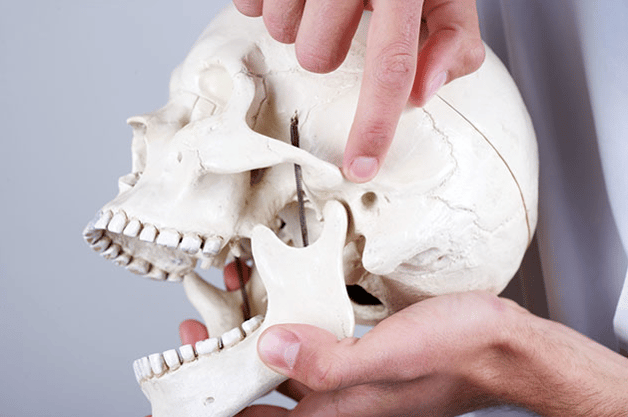
If you’ve ever felt or heard a snap or pop in your jaw accompanied by sharp pain in the joint or the closest ear, you may be one of the over 3 million Americans dealing with TMJ pain. The bad news is that it’s very common and difficult to completely avoid if you’re prone to it. The good news, however, is that it can resolve itself with time and thoughtful care can go a long way in treating the symptoms and providing relief.
What is TMJ (or TMD)?
TMJ (or, more accurately, TMD) refers to temporomandibular joint disorder, a group of related conditions affecting the jaw joints. The TM joints form the hinge that connects your lower jawbone to your skull, allowing you to open and close your mouth.
TMD is characterized by acute pain — which can progress to being chronic — in the joint itself or in the muscles and sinus cavities surrounding it, usually in connection with chewing and/or sideways movement of the lower jaw. It can manifest in one or more of the following ways:
- pain in the ear canal
- headaches and sore neck
- muscle tenderness around the jaw
- jaw pain that tends to be worst in the morning or late afternoon
- acute jaw pain when chewing or yawning
- limited mobility of the mouth or jaw
- clicking or popping noises when the mouth is opened
- sensitive teeth that are not related to other conditions
What causes TMD, and can it be prevented?

"If you’ve ever felt or heard a snap or pop in your jaw accompanied by sharp pain in the joint or the closest ear, you may be one of the over 3 million Americans dealing with TMJ pain."
The most common causes of TMD are arthritis, a misaligned bite, or injury to the jaw. In the first two cases, prevention is impossible since the underlying cause is primarily genetic in origin. Arthritis can be medically treated, but not yet cured. A misaligned bite can usually be effectively treated through orthodontics and/or oral surgery, although the process can take a very long time. Injuries to the jaw can theoretically be prevented, but since they’re most often due to unexpected accidents, treatment after the fact is far more common.
Stress is another contributing factor in many cases of TMD. Since stress often causes us to clench our jaws or grind our teeth, the joints can become sore and weakened to the point that chronic pain becomes a problem. Stress is tough to completely prevent, but many options exist to help control and relieve it, from breathing exercises to changing careers. If TMD is caused exclusively by stress, removing the cause of the stress can effectively cure the disorder.
What can you do about TMD at home?
In most cases, TMD is more of an occasional annoyance than anything else. When it occurs, sufferers can usually ease the pain by simply stopping the biting or chewing motion causing it and resting the joint momentarily. A gentle fingertip massage will help loosen up tense jaw muscles and help prevent further problems.
For more chronic jaw pain, over-the-counter pain relievers like Ibuprofen or Acetaminophen can be helpful, as can hot and cold compresses held to the joint. It can also be helpful to modify your diet during particularly painful periods to lessen the amount of force necessary to chew.
What can your dentist do about TMD?
If you think you may have TMD, it’s important to see your dentist for a formal diagnosis. While the diagnosis itself can be fairly quick and easy to obtain, the dentist will likely perform a number of tests and may take a set of x-rays and dental casts to help narrow down the origin of the problem.
Through examination, x-rays, and other diagnostic tests, your dentist should be able to pinpoint the root cause of your issue and recommend a detailed treatment strategy tailored to your personal circumstances. The key to finding eventual relief is to stick to that treatment schedule religiously and maintain contact with your dentist to discuss progress.
If the cost of obtaining dental treatment makes you hesitate to take this important step, consider joining a dental discount program that can offer significant discounts toward both the diagnostic and treatment portions of your TMD services. That way, the cost of receiving treatment won’t stand between you and relief.

